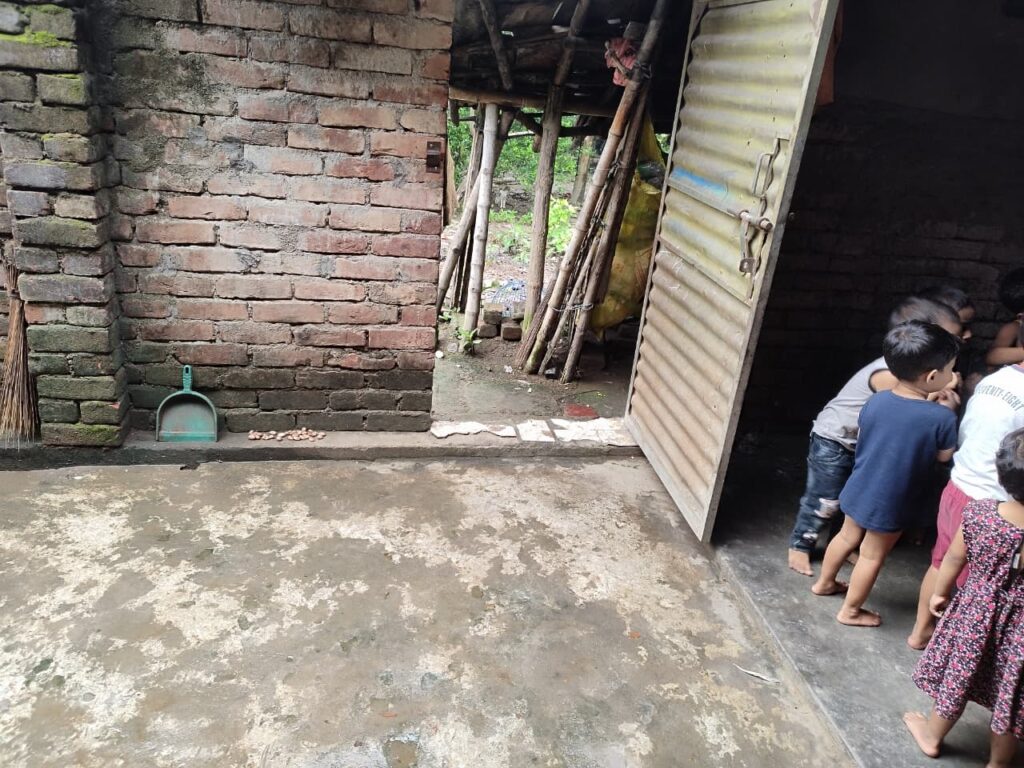Strong Roots for a Bright Future
Overall Improvement Of Anganwadi Centres In West Bengal
Anganwadi centres, established in the year 1975 under the Integrated Child Development Services (ICDS) scheme, play an important role in promoting the health- nutrition, and education for children below six years, as well as supporting pregnant and lactating mothers. They work as a community-based support system providing supplementary nutrition, immunization, health check-ups, preschool education, and nutrition awareness. It is an important foundation for child development in rural as well as urban areas. Anganwadi centres objective is to reduce child mortality, malnutrition, and school dropouts by giving children a better start in life. Besides the welfare of children, they empower women by spreading various awareness on health, good hygiene, and best childcare practices, making them a very strong cornerstone of India’s grassroots social development system.
Need Assessment and Constant Improvement
A Needs Assessment Study is an essential key for the improvement of Anganwadi Centres . It provides an understanding of the current lack in infrastructure, service delivery, resources and community expectations. The socio-economic and health situations of communities are dynamic. Regular assessments help to identify emerging problems such as malnutrition, pre-school education, mothers’ health issues, and the need for digital learning amenities. At the same time, it is an important principle of constant improvement. Needs assessment and steady improvement for keeping pace with developmental goals and ensuring that the Anganwadi Centres constantly contribute to the growth and development of children, mothers, and the community at broad spectrum. Habit development is very important in improving the bad condition of Anganwadi centres and transforming them into well-functioning spaces.

When Anganwadi workers, children, and community members follow healthy habits such as maintaining cleanliness, punctuality, regular health check-ups, and proper use of available resources, it creates a positive environment for learning and growth. Good habits like handwashing, keeping the premises clean, and ensuring proper nutrition practices help reduce health risks and improve the overall well-being of children. Similarly, developing habits of record-keeping, timely distribution of food, and active participation from parents and local communities ensures smooth functioning. Thus, habit development acts as a foundation.

Present Situation of Anganwadi centres in West Bengal:
The present condition of Anganwadi Centres in West Bengal shows both development and persistent challenges. While these Angnwadi Centres serve as a link for early childhood care, health-nutrition, and pre-primary education, many continue to struggle with inadequacy in infrastructure, poor sanitation conditions and inadequacy in learning materials. A huge number of centres operate in rented spaces, often lacking clean drinking water, toilets, and proper cooking amenities. Shortage of well trained staff, irregular supply of supplementary nutritious food , and overcrowded classrooms without proper sitting arrangement further hamper their effectiveness and productivity. Although government schemes like ICDS(Integrated Child Development Services) have improved connection, gaps in overall monitoring, funding for centres , and community participation limit their fullest potential.
As a result, children and mothers, especially in rural areas, do not get the quality services that are beneficial for health, growth-development and education of children. Mothers come seeking advice regarding nutrition and health, but the centre lacks proper materials to guide them in the correct way. Many centres operate in rented spaces without clean toilets or safe drinking water. In some areas, power cuts and lack of proper play and activity materials make pre-school education more like a formality than a joyful experience.
Pathway Of Improving Anganwadi Centres
The pathway to improving the condition of Anganwadi centres starts with strengthening their faulty-infrastructure by ensuring safe buildings, clean drinking water, hygienic toilets, and adequate learning spaces and equipment for children. Next, a proper step would be training and regular capacity building of Anganwadi workers and helpers is way more essential so they can provide quality early childhood care, nutrition, and pre-school education. Supply of nutritious food, growth monitoring equipment, and medical check-ups will help in early detection of malnutrition and health concerns. Community participation and collaboration with the local self-government bodies can increase responsibility and resource mobilization. Introducing modern digital tools for record-taking, learning, and monitoring can make services more effective and transparent. Proper funding, policy support, and periodic evaluation from government both (central and state) and Non-Government Organization are also necessary to sustain the improvements. Altogether, these steps can create a strong pathway for transformation of Anganwadi centres into hubs of child development and community welfare.


Financial Inclusion and Community Support
Start cultivating the habit of cleanliness, hygiene and creativity among the children. Private partnership is very important for the improvement of Anganwadi centres of West Bengal because government funds alone are often insufficient to meet the dynamic needs of children and mothers. Many centres lack in infrastructure such as safe classrooms, toilets and sanitation facilities, clean drinking water, and adequate learning and activity materials. Additional funds can help provide improved nutritious meals, regular medical check-ups, playing equipment, and digital learning equipment that go beyond the minimum standards.
Other than that, training programs for the skill improvement of Anganwadi workers, awareness campaigns for parents and parents to be, and regular healthcare camps require financial support that cannot always be covered with government funds. With funds from multiple sources, Anganwadi centres can be transformed into child-friendly places which not only promote health and nutrition but also ensure the best quality early childhood education and care, thereby securing a very strong foundation for future generations of India. After all West Bengal is known to make talents. Financial inclusion & collaboration play an important role in improvement of the infrastructure as well as facilities of Anganwadi centres in West Bengal. Proper finance ensures that centres are benefited with proper classrooms, safe drinking water, sanitation conditions and modern learning and activity materials. Promoting financial inclusion, communities at local level, small self-help groups can actively participate in gathering funds and resources as well as empowering ownership & accountability. AIMSC (Anganwadi Level Monitoring System Committee) should mainly focus on maintaining a strong monitoring as well as accountability systems on other hand repeatedly working on the improvement of the existing Anganwadi Centres. The committee should assure that centres have safe child-friendly infrastructure, well equipped and clean classrooms, proper , pure drinking water facility and play and activity areas. Importance should be given to providing good quality nutritious food, regular health check-ups by professionals and growth monitoring by various scientific methods to support the well-being of mothers and children. To strengthen early childhood education, Active community support, timely financial inclusion, and regular training of workers will enhance the effectiveness.Collaboration with other government agencies, corporate sectors under CSR initiatives, NGOs further enhances the scope of infrastructure improvement. Such collaborative efforts not only fill the resource gaps but also ensure that Anganwadi centres become a space that support child positive growth and development, nutrition, & preschool education. Community at local level, being the actual beneficiaries of the Anganwadi services, always come forward to show their support by gifting their own land for the improvement of Anganwadi centres. Anganwadi centres serve as the institute of early childhood care, health- nutrition, and education at pre-primary level, directly affecting the well-being of children, mothers and expected mothers. By giving land, the local community not only ensures the correct set up of infrastructure but also takes responsibility for nurturing the future generation of India. Such participation shows a sense of belonging and strengthening the bridge between the people and the foundation that serves them. This sensible gesture can transform the Anganwadis of west Bengal into well-equipped, hygienic and practical centres of growth and development of children under 6 years.
Conclusion
In the end, improvement of Anganwadi centres is not only a necessity but also a vital inclusion in the future of our nation. Strengthening these Anganwadi centres with better infrastructure, skilled workers, proper nutrition, and modern learning amenities have proportional benefit in health of children, growth, and education. Also supporting mothers and large communities. Effective fund inclusion, active community involvement, and collaboration with government, NGOs and private organizations can bridge the pre-existing gaps. Anganwadi centres carry the power to transform the lives of children as well as the future of the nation. They shape the young minds to learn the importance of good health, nutrition, and importance education, but their role is much more than that, by incorporating the daily habits of cleanliness, good hygiene practice, and other civic sense. Anganwadis make children into responsible citizens who will grow up with proper sense of respect for themselves, their own and other community, and also their country. Unfortunately, the important values are generally neglected in our own society. Anganwadis can create a bridge between the gaps. If we come forward as a team to support Anganwadis, we can improve better facilities and good infrastructure. And we need to remember that a single action by every individual in a community can sow the seeds of a clean, healthy, and more responsible as well as sustainable India. By giving transformation to Anganwadis with well-equipped, child-friendly hubs, we can confidently ensure that the solid foundation of early childhood growth and development can lead to healthier, more educated and empowered future generations of India.


